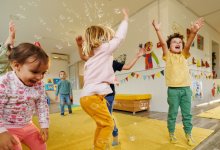- Creativity
Daily Activities That Support Students’ Creative Mindset
Teachers can provide learning experiences that guide high school students to become comfortable with uncertainty and risk-taking.Your content has been saved!
Go to My Saved Content. - Social & Emotional Learning (SEL)
How to Teach Kids to Be Kind to Themselves
Kindness toward others is often taught in elementary school, but it’s also important for students to extend it to themselves.Your content has been saved!
Go to My Saved Content. - Social & Emotional Learning (SEL)
Integrating Social and Emotional Learning in Math Class
Teachers can use these routines to seamlessly integrate SEL into math instruction to boost students’ proficiency and encourage a positive math identity.Your content has been saved!
Go to My Saved Content. - Administration & Leadership
Making the Shift to Learning Science
In Maryland, a district's decade of effort to train more than 4000 educators on how the brain learns best—so they can apply cognitive science in their own classrooms—begins to pay off.Your content has been saved!
Go to My Saved Content. - Classroom Management
4 Ways to Give Preschool Students Autonomy During Large Group Time
Students need clear boundaries, but they also need to feel that they belong during an activity and that their ideas shape their learning.Your content has been saved!
Go to My Saved Content. - Administration & Leadership
A 3-Step Strategy for Addressing Difficult Situations With Parents
Administrators can resolve complicated issues by holding an information-gathering meeting, conducting an investigation, and then circling back to parents.314Your content has been saved!
Go to My Saved Content. - Communication Skills
A Low-Stakes Public-Speaking Game for High School Students
By offering a quick, low-pressure way to practice, teachers can help students build their confidence and poise when talking in front of the class. - Administration & Leadership
A DIY Approach to Professional Development for Principals
Administrators can set annual goals and consult peers at other schools to create professional learning experiences that enhance their skills.203Your content has been saved!
Go to My Saved Content. - Project-Based Learning (PBL)
Implementing PBL in Physical Education
At its core, high-quality PBL uses content to teach, build, and assess skills like collaboration and problem-solving—and PE classes are a natural place to continue this work.324Your content has been saved!
Go to My Saved Content. - Administration & Leadership
How to Achieve Alignment Within Your Administrative Team
When leaders take the time to build shared understandings, they are able to work together more effectively to support their school community.360Your content has been saved!
Go to My Saved Content.
Popular
- Classroom Management
11 Classroom Management Tweaks You Don’t Learn in Teacher Prep
Over time, every teacher makes small changes that have a big impact on how their classes run. A veteran teacher shares the hacks that work for him. - Literacy
Just Like Phonics, Comprehension Requires Explicit Teaching
Once students can decode, they need ongoing and thoughtful instruction to understand, interpret, and engage with what they read.54.5kYour content has been saved!
Go to My Saved Content. - Teacher Wellness
The Research on Protecting Teacher Well-Being
Laurie Santos, host of the popular podcast The Happiness Lab, on how our minds deceive us, why "time affluence" matters, and what we can do to reset our parasympathetic nervous system.49.8kYour content has been saved!
Go to My Saved Content. - Classroom Management
60-Second Strategy: Playing Card Table Groups
Having students draw playing cards to randomize seating for small groups each week ensures that everyone experiences working with a variety of classmates.32.8kYour content has been saved!
Go to My Saved Content. - Formative Assessment
7 Low-Stakes Formative Assessment Activities
Building frequent checks for understanding into lessons can help teachers spot learning gaps in real time and adjust instruction before moving on.25.4kYour content has been saved!
Go to My Saved Content.
- Literacy
Using Multigenre Picture Books in Middle School
Books that convey nonfiction topics through poems and images help students learn to process information, a skill they can transfer to other texts.1.1kYour content has been saved!
Go to My Saved Content. - Integrated Studies
Combining Science and Music for Deeper Learning
Elementary music teachers can incorporate scientific concepts into lessons so students get a multilayered learning experience. - Integrated Studies
A Hands-On Approach to Interdisciplinary Learning
By integrating multiple subjects in a cohesive project, teachers can empower students to think flexibly and persist through challenges. - Project-Based Learning (PBL)
7 Projects Teachers Stand By
Planning for projects can be difficult and time-consuming. This list of teacher-tested projects—complete with printable resources—should offer a big head start. - Integrated Studies
Celebrating Pi Day Across the Curriculum
Engaging, informative Pi Day activities designed for middle school math, ELA, science, and social studies.
- Differentiated Instruction
4 High-Quality Math Enrichment Tasks
These low-floor, high-ceiling problems support differentiation, challenging all students by encouraging flexible thinking and allowing for multiple solution paths. - Differentiated Instruction
4 Ways to Make Story Problems More Engaging and Accessible
Four simple strategies—beginning with an image, previewing vocabulary, omitting the numbers, and offering number sets—can have a big impact on learning.2.1kYour content has been saved!
Go to My Saved Content. - Student Engagement
Taking Your Read-Alouds From Interactive to Immersive
Story time is a highlight of the day for many young students, and teachers can boost engagement even further by adding costumes and sound effects.3.4kYour content has been saved!
Go to My Saved Content. - Differentiated Instruction
A 6-Step Plan for Differentiated Instruction
Middle school teachers can follow a straightforward method that facilitates customization of support for students.4.3kYour content has been saved!
Go to My Saved Content. - Classroom Management
How to Differentiate Without Splitting Students Up
Advice for teachers who want to make sure everyone in their classroom works and learns in tandem.80kYour content has been saved!
Go to My Saved Content.
- Instructional Coaching
Facilitating Instructional Rounds for New Staff
Schools can use this protocol to reduce isolation, build trust, and make both veteran and new teachers feel valued.1.8kYour content has been saved!
Go to My Saved Content. - Instructional Coaching
Flipping the Lens on Classroom Observations With the ‘Inside-Out’ Method
Quick, low-stakes observations focused on student learning allow administrators to provide teachers with useful feedback on instruction.7.5kYour content has been saved!
Go to My Saved Content. - Instructional Coaching
3 Innovative Instructional Coaching Models
These strategies bring teachers together and naturally generate evidence of coaching’s impact on student learning.7.2kYour content has been saved!
Go to My Saved Content. - Assessment
How to Develop Test-Ready Students
There’s a difference between teaching to the test and developing test-specific thinking that will help students effectively apply what they’ve learned all year. - Instructional Coaching
How Instructional Coaches Can Balance Confidentiality and Accountability
These strategies help instructional coaches build trust with teachers and provide transparency with administrators to maximize impact.3.2kYour content has been saved!
Go to My Saved Content.




























